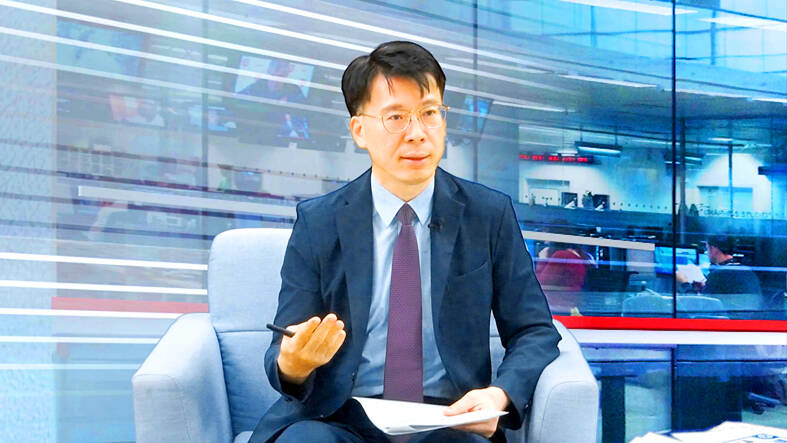China disposes seven times as much nuclear waste as Japan plans to release, but no pollution has been detected in waters near Kinmen County, Atomic Energy Council Secretary-General Wang Chung-der (王重德) said in an interview yesterday, ahead of Japan’s planned release of nuclear wastewater starting this month.
He made the remarks in a video interview with the Chinese-language Liberty Times (the Taipei Times’ sister newspaper) published on its Web site.
China operates a large number of nuclear power plants along its southeastern seaboard that utilize pressurized water reactors, which discharge wastewater with a higher concentration of tritium than boiling water reactors used by the tsunami-crippled Fukushima Dai-ichi nuclear power plant in Japan, he said.

Photo: Huang Chun-hsuan, Taipei Times
Chinese nuclear power plants discharged seven to eight times more tritium-infused water than the Japanese plan for Fukushima Dai-ichi would release in a year, he said.
China’s Qingshan III nuclear power plant in Zhejiang Province discharges 143 trillion becquerels (Bq) yearly, while the Yangjiang and Ningde plants in China’s Guangdong and Fujian provinces discharge 122 trillion Bq and 111 trillion Bq respectively, and the Hongyanhe plant in Liaoning Province discharges 107 trillion Bq, he said, citing official Chinese data.
The total tritium output from these four plants — which lead China in the quantity of the substance released — is the equivalent of five times the planned annual discharge from the Fukushima Dai-ichi plant, he said.
The council regularly monitors the sea at various locations for radioactive materials, and nine of these locations are situated in the waters off Kinmen, Lienchiang and Penghu counties, Wang said.
It is capable of measuring radioactivity in the wastewater from China’s nuclear power plants, he said, adding that these nine stations have detected no radiological activity beyond background radiation.
The Japanese plan to dispose of the wastewater from Fukushima Dai-ichi involves processing the water to remove all radioactive elements except tritium and it has been approved by the International Atomic Energy Agency (IAEA), he said.
Tritium is a radioactive isotope of hydrogen and the radiation it emits does not penetrate skin, Wang said, adding that the substance is believed to be carcinogenic only if ingested in extremely large amounts.
Medical literature does not indicate that ingesting trace amounts of tritium can cause negative health effects, Wang said.
Although Taiwan is not an IAEA member, the nation signed a memorandum of understanding with Japan to share relevant information about nuclear energy and receive updates on Tokyo’s plans to release wastewater as quickly as agency member states do, he said.
Delegations of Taiwanese experts have visited Japan three times to inspect the water processing technology to ensure that radioactivity from more than 60 types of radionuclides were removed from water as Japan claimed, he said.
When Japan moves forward with the discharge plan this month, a Taiwanese team would monitor the situation and keep lines of communication open at the source, Wang said.
The council is in the process of implementing measures to protect public safety, including increasing the number of seawater sampling locations from 33 to 107 and establishing a lab to measure tritium levels in seafood, he said.

EVA Airways today confirmed the death of a flight attendant on Saturday upon their return to Taiwan and said an internal investigation has been launched, as criticism mounted over a social media post accusing the airline of failing to offer sufficient employee protections. According to the post, the flight attendant complained of feeling sick on board a flight, but was unable to take sick leave or access medical care. The crew member allegedly did not receive assistance from the chief purser, who failed to heed their requests for medical attention or call an ambulance once the flight landed, the post said. As sick

A drunk woman was sexually assaulted inside a crowded concourse of Taipei Railway Station on Thursday last week before a foreign tourist notified police, leading to calls for better education on bystander intervention and review of security infrastructure. The man, surnamed Chiu (邱), was taken into custody on charges of sexual assault, taking advantage of the woman’s condition and public indecency. Police discovered that Chiu was a fugitive with prior convictions for vehicle theft. He has been taken into custody and is to complete his unserved six-month sentence, police said. On Thursday last week, Chiu was seen wearing a white

The Taichung District Court yesterday confirmed its final ruling that the marriage between teenage heir Lai (賴) and a man surnamed Hsia (夏) was legally invalid, preventing Hsia from inheriting Lai’s NT$500 million (US$16.37 million) estate. The court confirmed that Hsia chose not to appeal the civil judgement after the court handed down its ruling in June, making the decision final. In the June ruling, the court said that Lai, 18, and Hsia, 26, showed “no mutual admiration before the marriage” and that their interactions were “distant and unfamiliar.” The judge concluded that the couple lacked the “true intention of

EVA Airways, one of the leading international carriers in Taiwan, yesterday said that it was investigating reports that a cabin crew manager had ignored the condition of a sick flight attendant, who died on Saturday. The airline made the statement in response to a post circulating on social media that said that the flight attendant on an outbound flight was feeling sick and notified the cabin crew manager. Although the flight attendant grew increasingly ill on the return flight, the manager did not contact Medlink — a system that connects the aircraft to doctors on the ground for treatment advice during medical